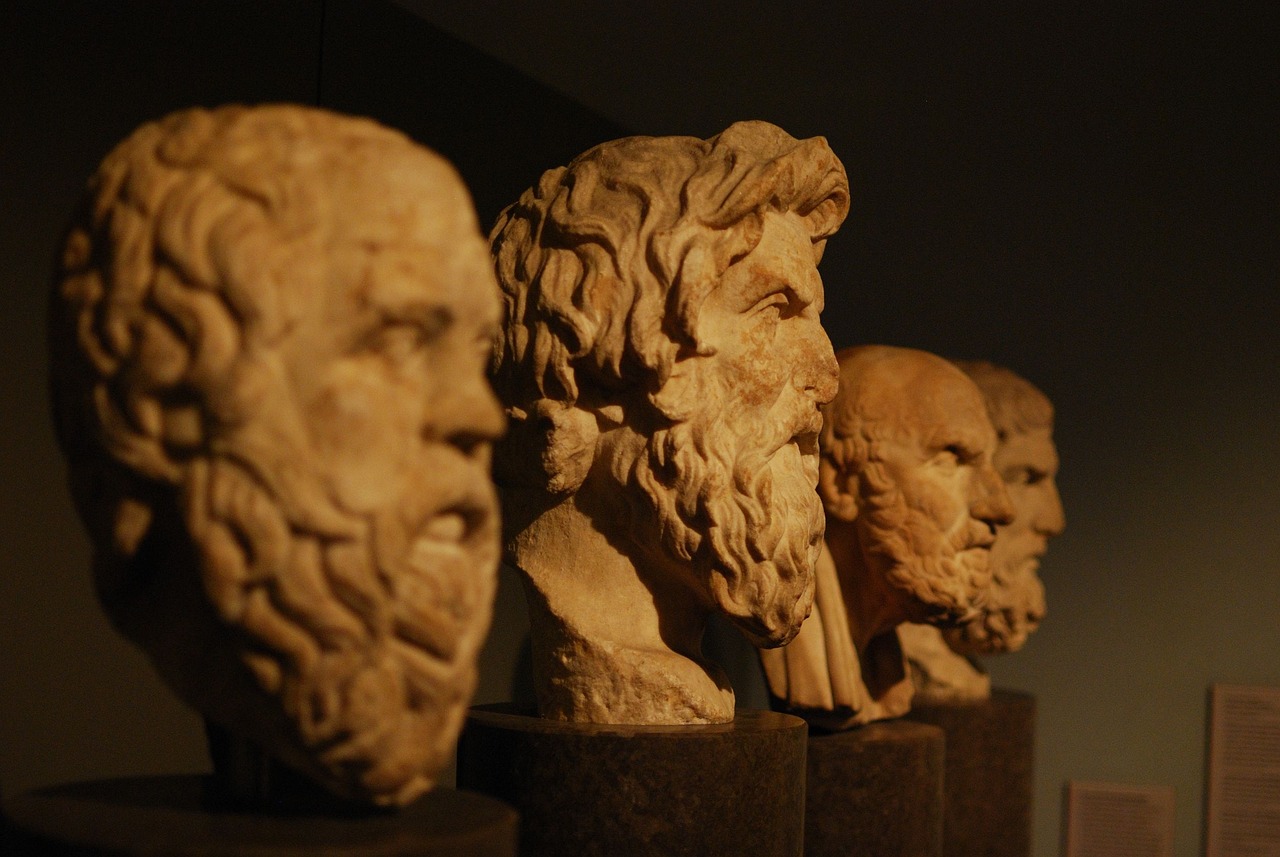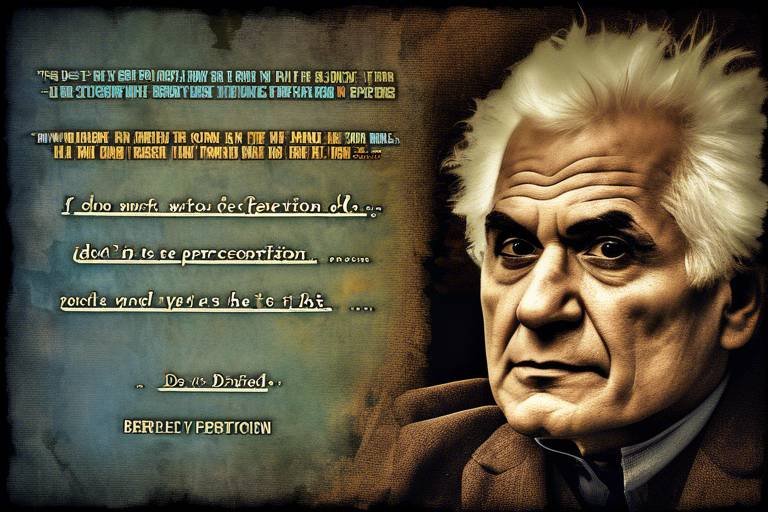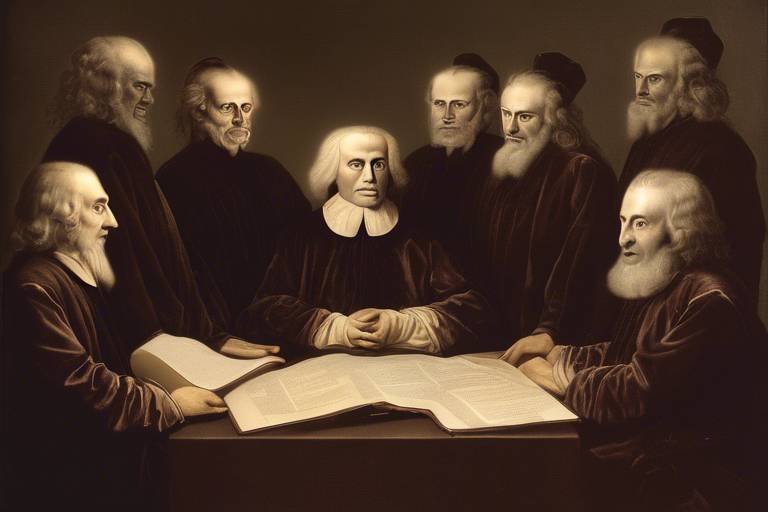The Metaphysics and Epistemology of Aristotle
Aristotle, a towering figure in Western philosophy, has contributed significantly to the fields of metaphysics and epistemology. His thoughts have shaped the way we understand existence, reality, and knowledge. Imagine trying to build a house without a solid foundation; that’s how crucial Aristotle’s ideas are to the entire structure of philosophical thought. In this article, we will dive deep into his theories, exploring concepts like substance, causality, and the nature of knowledge. Whether you're a seasoned philosopher or just dipping your toes into the vast ocean of philosophical inquiry, Aristotle's work offers a treasure trove of insights that are both profound and practical.
At the heart of Aristotle's metaphysical framework lies his concept of substance. He makes a critical distinction between primary substances, which are individual entities, and secondary substances, which refer to the species and genera that classify these entities. Think of primary substances as the unique fingerprints of existence—each one distinct and irreplaceable. Secondary substances, on the other hand, are like the broader categories that help us make sense of the world around us. They shape our understanding of existence and reality, providing a framework that allows us to categorize and comprehend the myriad forms of life and matter that populate our universe.
Aristotle's doctrine of the four causes—material, formal, efficient, and final—offers a comprehensive lens through which we can examine why things exist as they do. This framework serves as a roadmap for understanding the nature of change and purpose in the universe. Each cause answers a fundamental question about an object's existence:
- Material Cause: What is it made of?
- Formal Cause: What is its essence or form?
- Efficient Cause: What brought it into existence?
- Final Cause: What is its purpose?
By analyzing these causes, we gain insights into the intricate web of existence, allowing us to appreciate the complexity and interconnectedness of all things.
The material cause refers to the physical substance that composes an object. It emphasizes the importance of matter in understanding the existence and properties of entities within the natural world. For instance, consider a wooden table; the wood itself is its material cause. Without this physical substance, the table could not exist in its current form. This concept leads us to ponder: how does the material composition of an object influence its identity and functionality?
Concrete examples of material causes illustrate how different substances contribute to the identity and characteristics of various objects. For example:
| Object | Material Cause |
|---|---|
| Wooden Chair | Wood |
| Glass Bottle | Glass |
| Iron Gate | Iron |
These examples shed light on Aristotle's practical approach to metaphysics and how he viewed the relationship between matter and form.
The implications of material causes extend beyond mere physicality. They influence discussions on the nature of existence and the relationship between matter and form in philosophical discourse. By understanding the material cause, we can delve deeper into questions about identity, change, and the essence of things. For Aristotle, this exploration is not just academic; it has real-world implications for how we perceive and interact with our surroundings.
The formal cause pertains to the essence or form of an object. It highlights how the characteristics that define an entity contribute to its identity and classification within Aristotle's metaphysical framework. Think of it as the blueprint that gives shape to the raw materials. For instance, the design of a sculpture is its formal cause, distinguishing it from a block of marble. This concept invites us to ask: what makes something what it is? How do we classify and categorize the objects in our world?
Aristotle's epistemology examines the nature of knowledge, belief, and justification. He emphasizes that empirical observation and rational deduction are essential components of acquiring true understanding of the world. This dual approach—melding observation with logic—creates a robust framework for pursuing knowledge.
Aristotle posits that empirical knowledge, gained through sensory experience, is foundational to understanding the world. He advocates for observation as a critical method in the pursuit of truth. Imagine trying to learn how to ride a bike by only reading about it; without getting on the bike and experiencing it firsthand, you’d never truly grasp the concept. This is the essence of Aristotle's belief in empirical knowledge.
On the flip side, rational knowledge involves the use of logic and reasoning to derive conclusions from empirical observations. Aristotle illustrates the interplay between experience and intellectual inquiry in the quest for knowledge. It’s like building a puzzle; you need both the pieces (empirical data) and the picture on the box (rational thought) to see the whole image clearly.
What are the four causes according to Aristotle?
The four causes are material, formal, efficient, and final causes, each explaining different aspects of why an object exists as it does.
How does Aristotle define substance?
Aristotle defines substance as that which exists independently, with primary substances being individual entities and secondary substances being their classifications.
What is the significance of empirical knowledge in Aristotle's philosophy?
Empirical knowledge is crucial for Aristotle as it forms the basis for understanding the world through sensory experience, which he believes is essential for acquiring true knowledge.

Aristotle's Concept of Substance
Aristotle's notion of substance is not just a philosophical term; it’s the very bedrock of his entire metaphysical framework. Imagine trying to build a house without a foundation—this is how crucial substance is to understanding Aristotle's view of reality. He makes a distinction between two types of substances: primary substances and secondary substances. Primary substances are the individual entities we encounter in our everyday lives, like a specific tree or a particular person. They are unique and irreplaceable. On the other hand, secondary substances refer to the categories or classifications that these individual entities belong to, such as 'tree' or 'human'. This distinction is vital as it shapes Aristotle's understanding of existence itself.
To put it simply, think of primary substances as the characters in a play, each with their own unique traits and stories, while secondary substances represent the roles they play in the broader narrative. This duality helps us grasp the complexity of reality. When we talk about what something is, we often refer to both its individual characteristics and its categorical identity. For instance, a specific oak tree (primary substance) belongs to the category of trees (secondary substance). This classification aids in our understanding of not just what exists, but how we can relate to and interact with those entities.
Aristotle's exploration of substance leads us to consider the nature of existence itself. He argues that to understand a substance, we must also understand its essence, which is defined by its properties and attributes. But here's where it gets even more interesting: Aristotle believes that these properties are not just superficial traits; they are essential to the identity of the substance. For example, the ability of a tree to grow, reproduce, and provide shade are all integral aspects of what it means to be a tree. If we strip away these characteristics, we lose the very essence of what makes that tree a tree.
Moreover, Aristotle's concept of substance also emphasizes the importance of change and persistence. Substances can undergo changes, such as growth or decay, yet they remain the same entity at their core. This idea leads us to ponder: how can something change and still remain itself? It's a profound question that touches on the very fabric of our understanding of reality. Aristotle's framework allows us to appreciate the dynamic nature of existence while still recognizing the underlying permanence of substances.
In conclusion, Aristotle's concept of substance is not merely an abstract idea; it is a practical approach to understanding the world around us. By distinguishing between primary and secondary substances, he provides us with a lens through which we can explore the complexities of existence. This duality not only enriches our philosophical discourse but also invites us to engage with the world in a more meaningful way. After all, when we understand the essence of things, we can better appreciate their role in the grand tapestry of life.
- What is the difference between primary and secondary substances?
Primary substances are individual entities, while secondary substances refer to the categories they belong to. - Why is substance important in Aristotle's philosophy?
Substance is foundational to Aristotle's metaphysical framework, shaping our understanding of existence and reality. - How does Aristotle's concept of substance relate to change?
Aristotle argues that substances can change while maintaining their identity, leading to deeper questions about the nature of existence.

The Four Causes
Aristotle's doctrine of the four causes—material, formal, efficient, and final—serves as a cornerstone in understanding why things exist as they do. This comprehensive framework not only provides insights into the nature of change but also sheds light on the purpose behind various phenomena in the universe. Think of it as a lens through which we can view the complexities of existence. Each cause plays a unique role, much like the different instruments in an orchestra, working together to create a harmonious understanding of reality.
The material cause refers to the physical substance that makes up an object. Without this foundational element, we wouldn't be able to discuss the existence of anything at all. For instance, consider a wooden table. The wood itself is the material cause; it is the very substance that gives the table its form and function. Without the wood, there would be no table to talk about. This highlights the importance of matter in shaping our understanding of entities within the natural world.
To further illustrate the concept of material causes, let's delve into some concrete examples. When you think of a statue, the marble or bronze used to craft it serves as the material cause. Similarly, in the case of a cake, the flour, sugar, and eggs are the essential components that make it what it is. These examples demonstrate how different substances contribute to the identity and characteristics of various objects. Aristotle's practical approach to metaphysics emphasizes that understanding these material causes is crucial for grasping the essence of things.
| Object | Material Cause |
|---|---|
| Statue | Marble or Bronze |
| Table | Wood |
| Cake | Flour, Sugar, Eggs |
Now, let's consider the implications of material causes. The significance of material causes extends beyond mere physicality. They influence discussions on the nature of existence and the intricate relationship between matter and form in philosophical discourse. For instance, when we ponder the essence of a living being, we realize that its material composition—like cells and tissues—plays a vital role in defining its identity. Thus, material causes are not just about what things are made of; they also provoke deeper questions about the essence of being itself.
Moving on to the formal cause, this aspect pertains to the essence or form of an object. It highlights how the characteristics that define an entity contribute to its identity and classification within Aristotle's metaphysical framework. If we take the example of a car, its formal cause would be the design and engineering principles that determine what makes it a car as opposed to a bicycle. This essence is what allows us to categorize different entities and understand their place in the grand scheme of existence.
In summary, Aristotle's four causes—material, formal, efficient, and final—offer a multifaceted approach to understanding the world around us. By dissecting the layers of existence through these causes, we gain profound insights into the nature of reality, change, and purpose. Just as a detective unravels clues to solve a mystery, Aristotle's framework helps us piece together the intricate puzzle of existence.
- What are the four causes according to Aristotle? Aristotle identifies four causes: material, formal, efficient, and final, each explaining different aspects of existence.
- How does the material cause differ from the formal cause? The material cause refers to the physical substance of an object, while the formal cause pertains to its essence or defining characteristics.
- Why are the four causes important in philosophy? They provide a comprehensive framework for understanding the reasons behind existence and the nature of change, enriching philosophical discourse.
- Can you give an example of efficient cause? An efficient cause is the agent or process that brings something into existence, like a sculptor who carves a statue from marble.

Material Cause
When we dive into Aristotle's concept of the material cause, we are essentially peeling back the layers of what makes up the very essence of an object. Aristotle believed that to truly understand something, we must first grasp what it is made of. This idea is not just an academic exercise; it's a fundamental aspect of how we perceive and interact with the world around us. Imagine trying to understand a sculpture without knowing it's made of marble or clay. The material cause is that crucial ingredient that gives an object its identity and characteristics.
In Aristotle's framework, the material cause is one of the four causes that explain why things exist as they do. It answers the question, "What is it made of?" For instance, consider a wooden table. The material cause here is the wood itself. Without the wood, there is no table; it cannot exist in its current form. This relationship between matter and identity is pivotal in Aristotle's metaphysical discussions.
To further illustrate this point, let’s look at some concrete examples of material causes:
- Gold Ring: The material cause is the gold, which gives the ring its value and form.
- Water Bottle: The plastic or glass that composes the bottle is its material cause, influencing its functionality and durability.
- Human Body: The cells, tissues, and organs constitute the material cause, shaping our physical existence and capabilities.
These examples show that the material cause is not merely about physicality; it extends into discussions about existence itself. The implications of material causes stretch far and wide, weaving into the fabric of philosophical discourse. For instance, when we discuss the relationship between matter and form, we are engaging with the very nature of reality. Aristotle's emphasis on material causes invites us to consider how the physical world influences our understanding of existence and identity.
Moreover, Aristotle's exploration of material causes pushes us to think about the implications of change. When an object undergoes transformation, such as a tree being cut down to create furniture, what remains constant? The material cause—the wood—retains its essence despite the change in form. This idea resonates with the broader philosophical inquiry into what it means for something to exist and how we categorize different entities in our world.
In conclusion, the material cause is a foundational concept in Aristotle's metaphysics. It invites us to consider not just the physical components of objects but also the broader implications of these components on our understanding of reality. By recognizing the significance of material causes, we open ourselves to a richer comprehension of existence, identity, and the intricate web of relationships that define the world around us.
- What is the material cause in Aristotle's philosophy? The material cause refers to the physical substance that composes an object, such as wood for a table or gold for a ring.
- Why is understanding the material cause important? Understanding the material cause helps us grasp the identity and characteristics of objects, influencing our perception of reality.
- How does the material cause relate to change? The material cause remains the same even when an object changes form, highlighting the distinction between matter and identity.

Examples of Material Causes
To grasp Aristotle's notion of material causes, let’s dive into some concrete examples that vividly illustrate how different substances shape the identity and properties of objects in our world. Imagine a simple wooden table. What makes this table a table? At first glance, it might seem obvious, but Aristotle would argue that its material cause—the wood itself—is fundamental to its existence. Without the wood, there would be no table. This principle can be extended to various everyday objects, each exhibiting unique material causes that contribute to their essence.
Consider a few more examples:
- Marble Statue: The marble serves as the material cause, giving the statue its form and beauty. Without the marble, the artist's vision would remain unrealized.
- Glass Bottle: The glass is the material cause that defines the bottle's structure. It allows for the containment of liquids, showcasing how material properties influence functionality.
- Iron Bridge: The iron beams are the material cause, providing strength and stability. The choice of material directly impacts the bridge's durability and safety.
These examples highlight that material causes are not merely about physicality; they also influence how we perceive and interact with the world around us. The relationship between an object and its material cause can be likened to a recipe—without the right ingredients, the dish simply cannot exist. Furthermore, Aristotle's insights into material causes prompt deeper reflections on the nature of existence itself. For instance, when we ponder the essence of a living organism, we recognize that its biological makeup, from cells to tissues, serves as its material cause, intricately linked to its identity and functionality.
Moreover, the implications of material causes extend into various fields, such as science and art. In science, understanding the material composition of substances can lead to innovations in technology and medicine. Meanwhile, in art, the choice of materials can profoundly affect the artistic expression and emotional impact of a piece. Therefore, Aristotle's exploration of material causes not only enriches our philosophical understanding but also resonates across multiple disciplines, emphasizing the interconnectedness of existence, identity, and essence.

Implications of Material Causes
The implications of material causes in Aristotle's metaphysics are both profound and far-reaching, extending beyond the mere physicality of objects to influence broader philosophical discussions. By understanding what something is made of, we can begin to unravel the complexities of its existence and identity. This perspective invites us to consider not just the substance itself, but also how that substance interacts with its environment and contributes to its overall essence.
For example, when we think about a wooden table, the material cause is the wood itself. However, this leads us to ask deeper questions: What type of wood is it? How does the wood's origin affect its durability and appearance? This inquiry highlights the interconnectedness of material cause with other aspects of existence, such as functionality and context. The material cause is not an isolated concept; it serves as a gateway to understanding the relationships between different entities and their roles within the universe.
Furthermore, the implications of material causes challenge us to rethink our approach to knowledge and reality. In a world where we often prioritize abstract concepts and ideas, Aristotle's emphasis on material causes grounds us in the tangible. It reminds us that knowledge is not solely derived from theoretical constructs but is deeply rooted in the physical world. This perspective encourages a more holistic view of existence, where matter and form are seen as interdependent rather than separate entities.
In practical terms, recognizing the significance of material causes can lead to a more informed understanding of various fields, such as science, art, and ethics. For instance:
- In science, understanding the material composition of substances can lead to breakthroughs in technology and medicine.
- In art, the choice of materials can profoundly affect the aesthetic and emotional impact of a piece.
- In ethics, recognizing the material conditions of individuals can inform our approach to social justice and policy-making.
Ultimately, the implications of material causes extend beyond philosophy into the very fabric of our daily lives, urging us to consider how the physical world shapes our understanding of existence. By embracing this holistic perspective, we not only honor Aristotle's legacy but also enrich our own comprehension of the complex interplay between matter and meaning.
- What are material causes in Aristotle's philosophy?
Material causes refer to the physical substances that compose an object, highlighting the importance of matter in understanding the identity and properties of entities. - How do material causes influence our understanding of existence?
Material causes invite us to explore the relationships between substances and their environments, grounding our understanding of reality in the tangible world. - Can material causes be applied to modern scientific inquiries?
Yes, recognizing material causes can lead to significant advancements in various fields, including science, art, and ethics, by emphasizing the importance of physical composition.

Formal Cause
The formal cause is a pivotal concept in Aristotle's metaphysical framework, serving as the blueprint or essence that defines what an object is. Think of it as the DNA of an entity, encapsulating its identity and characteristics. This idea emphasizes that every object possesses a specific form that dictates its nature and classification. For instance, when we consider a chair, its formal cause is not merely the wood or metal it’s made from, but rather the design and purpose that classify it as a chair. This intrinsic form is what distinguishes one type of object from another, shaping our understanding of reality.
In Aristotle's view, the formal cause is essential for grasping the essence of things. It answers the question, “What is it?” rather than just “What is it made of?” This distinction is crucial because it allows us to categorize and comprehend the world around us. By understanding the formal cause, we can appreciate why a specific entity functions the way it does, revealing the underlying principles that govern its existence.
To illustrate this concept further, let’s consider a few examples:
| Object | Formal Cause |
|---|---|
| Tree | The structure and biological processes that define it as a tree. |
| Book | The arrangement of pages and the idea it conveys. |
| Car | The design and engineering that classify it as a vehicle. |
These examples underscore how the formal cause is not just an abstract concept; it has tangible implications in our daily lives. By recognizing the formal cause, we can better understand the relationships between different entities and their roles within the broader context of existence. This understanding not only enriches our philosophical inquiries but also enhances our appreciation for the complexity of the world.
Moreover, the implications of the formal cause extend into various fields, including science, art, and ethics. In science, for instance, understanding the formal cause of a phenomenon can lead to breakthroughs in research and technology. In art, the formal cause helps artists convey their intentions and messages through their work. In ethics, recognizing the essence of actions can shape our moral judgments and decisions.
Ultimately, Aristotle's concept of the formal cause invites us to delve deeper into the essence of things, encouraging a more profound exploration of reality. It challenges us to look beyond the surface and consider the fundamental characteristics that define our world. In a way, it’s like peeling back the layers of an onion, revealing the core truths that lie beneath.
- What is the formal cause in Aristotle's philosophy? The formal cause refers to the essence or form of an object, which defines its identity and characteristics.
- How does the formal cause differ from other types of causes? Unlike material causes, which focus on what an object is made of, the formal cause emphasizes the design and purpose that classify an object.
- Can you provide an example of formal cause? Sure! For a book, the formal cause would be its structure, including the arrangement of pages and the narrative it conveys.
- Why is understanding the formal cause important? Understanding the formal cause helps us grasp the essence of things, enhancing our comprehension of reality and the relationships between different entities.

Epistemology: Knowledge and Belief
Aristotle's epistemology is a fascinating exploration into the nature of knowledge, belief, and the all-important concept of justification. He dives deep into how we come to know what we know, emphasizing that our understanding of the world is not just a matter of belief but is grounded in empirical observation and rational deduction. Imagine trying to build a house without a solid foundation; similarly, Aristotle argues that knowledge must be rooted in experience and reason to stand firm against skepticism.
At the heart of Aristotle's epistemology is the idea that knowledge is not merely a passive reception of information but an active process of inquiry. He posits that our senses play a critical role in this process. Through empirical knowledge, we gather data from the world around us. This sensory experience forms the basis of our understanding, akin to how a painter uses colors to create a masterpiece. Without these colors, the canvas remains bare, just as without sensory input, our understanding of the world is incomplete.
Aristotle categorizes knowledge into two main types: empirical knowledge and rational knowledge. Empirical knowledge is derived from our senses—what we see, hear, touch, taste, and smell. This type of knowledge is foundational, as it provides the raw data from which we construct our understanding of reality. For instance, when you see a tree, you don't just recognize it; you observe its color, shape, and texture, all of which contribute to your knowledge of what a tree is.
On the other hand, rational knowledge comes into play as we begin to analyze and interpret the data collected through our senses. This is where logic and reasoning come into the picture. Aristotle believed that by using logical principles, we could draw conclusions and form beliefs that are justified. Think of it like solving a puzzle: the pieces are your sensory experiences, and rational thought is the strategy you use to fit them together into a coherent picture.
To illustrate the interplay between these two forms of knowledge, let's consider the following table:
| Type of Knowledge | Description | Example |
|---|---|---|
| Empirical Knowledge | Knowledge gained through sensory experience. | Observing that the sky is blue. |
| Rational Knowledge | Knowledge derived from logical reasoning. | Inferring that the sky appears blue due to the scattering of light. |
This table highlights how empirical knowledge serves as the groundwork for rational knowledge. Without the initial observation of the sky's color, the logical deduction regarding light scattering would not be possible. Aristotle's approach encourages us to appreciate the synergy between experience and reason in our quest for understanding.
Moreover, Aristotle emphasizes the importance of justification in the realm of knowledge. Just believing something doesn't make it true; there must be a logical basis for our beliefs. This is where the concept of justified true belief comes into play. To truly know something, we must believe it, it must be true, and we must have justification for that belief. This triadic relationship is crucial in distinguishing mere opinion from genuine knowledge.
In conclusion, Aristotle's epistemology invites us to reflect on how we acquire knowledge and the intricate dance between our senses and our reasoning abilities. It challenges us to think critically about our beliefs and to seek justification for them. In a world overflowing with information, Aristotle’s insights remain relevant, urging us to strive for a deeper understanding rather than settling for superficial knowledge.
- What is the difference between empirical and rational knowledge?
Empirical knowledge is based on sensory experience, while rational knowledge is derived from logical reasoning applied to those experiences.
- Why is justification important in Aristotle's epistemology?
Justification is crucial because it distinguishes true knowledge from mere belief. To know something, one must believe it, it must be true, and there must be a justification for that belief.
- How do Aristotle's ideas on knowledge apply today?
His emphasis on empirical observation and rational deduction encourages critical thinking and a scientific approach to understanding the world, which is essential in our information-rich society.

Empirical Knowledge
Aristotle's perspective on is nothing short of revolutionary. He believed that our understanding of the world is rooted in sensory experience. This means that before we can form any abstract concepts or theories, we must first observe and interact with the world around us. Imagine trying to understand the flavor of a fruit you've never tasted. You can read all about how sweet it is, but until you take a bite, you'll never truly grasp its essence. This is the crux of Aristotle's argument—knowledge starts with what we can see, hear, touch, taste, and smell.
In Aristotle's view, empirical knowledge is not just about passively receiving information; it's an active process. He emphasized that observation is a critical method in the pursuit of truth. This is where science finds its roots in Aristotle's philosophy. By systematically observing nature and gathering data, we can draw conclusions that lead to a deeper understanding of reality. For Aristotle, the world is like a vast puzzle, and each observation is a piece that helps us complete the picture.
To illustrate how empirical knowledge operates, consider the following table that outlines the relationship between sensory experiences and knowledge acquisition:
| Sensory Experience | Type of Knowledge Gained |
|---|---|
| Sight | Visual knowledge of color, shape, and movement |
| Sound | Auditory knowledge of pitch, volume, and rhythm |
| Taste | Gustatory knowledge of flavor profiles |
| Touch | Tactile knowledge of texture and temperature |
| Smell | Olfactory knowledge of scents and their associations |
This table highlights how each sense contributes uniquely to our overall understanding of the world. For instance, without the sense of touch, we would struggle to understand the concept of temperature or texture, which are essential in identifying materials and their properties.
However, Aristotle didn't stop at just advocating for sensory experience; he also recognized the limitations of relying solely on observation. He argued that while empirical knowledge is foundational, it must be complemented by rational knowledge. This interplay between observation and reasoning forms the bedrock of Aristotle's epistemology. It’s like having a map and a compass; while the map gives you a visual representation of the land, the compass helps you navigate it effectively.
In conclusion, Aristotle's emphasis on empirical knowledge revolutionized the way we approach understanding the world. By advocating for the importance of observation and sensory experience, he laid the groundwork for modern scientific inquiry. His ideas remind us that knowledge is not merely a collection of facts but a dynamic process that requires both experience and reasoning to truly grasp the complexities of reality.
- What is empirical knowledge according to Aristotle?
Empirical knowledge, as per Aristotle, is knowledge gained through sensory experience and observation of the world around us. - How does empirical knowledge differ from rational knowledge?
Empirical knowledge is based on observation and experience, while rational knowledge relies on logic and reasoning derived from those observations. - Why is observation important in Aristotle's philosophy?
Observation is crucial because it serves as the foundation for understanding reality, allowing us to gather data that can lead to deeper insights.

Rational Knowledge
When we dive into the depths of Aristotle's epistemology, we find that rational knowledge plays a pivotal role in how we come to understand the world around us. Unlike empirical knowledge, which relies heavily on sensory experience, rational knowledge is all about the brain's power to think critically and logically. Imagine your mind as a detective, piecing together clues from your observations to solve the mystery of existence. Aristotle believed that through reasoning and logic, we can derive conclusions that go beyond mere appearances, allowing us to grasp the underlying truths of reality.
Rational knowledge is not just a separate entity; it works hand-in-hand with empirical knowledge. Think of it like a dance where both partners need to be in sync to create a beautiful performance. For instance, when you observe a tree, you can gather empirical data—its height, color, and texture. But to truly understand what a tree is, you must engage in rational thought, analyzing its characteristics and categorizing it within the broader context of living organisms. This interplay between observation and reasoning is crucial in Aristotle's framework.
Furthermore, Aristotle outlines a systematic approach to rational knowledge through syllogism, a form of logical reasoning where conclusions are drawn from two or more premises. Here’s a simple example:
| Premise 1 | Premise 2 | Conclusion |
|---|---|---|
| All humans are mortal. | Socrates is a human. | Therefore, Socrates is mortal. |
This example illustrates how rational knowledge allows us to connect dots and arrive at conclusions that are not immediately observable. It’s like having a map that guides you through a maze of information, helping you navigate the complexities of understanding. Aristotle's emphasis on rationality encourages us to question our beliefs and seek justifications for them, leading to a more profound understanding of the world.
In essence, rational knowledge equips us with the tools to not just accept what we see but to critically analyze and interpret it. It invites us to engage in a dialogue with our thoughts, challenging assumptions and expanding our horizons. This is where the magic happens—when we combine our sensory experiences with rational thought, we unlock a deeper comprehension of existence, one that Aristotle believed was essential for achieving true knowledge.
- What is the difference between empirical and rational knowledge? Empirical knowledge is based on sensory experiences, while rational knowledge relies on logical reasoning and deduction.
- How does Aristotle's concept of rational knowledge apply today? It encourages critical thinking and analytical skills, which are vital in various fields, from science to philosophy.
- Can rational knowledge exist without empirical knowledge? While they are interconnected, rational knowledge can sometimes lead to conclusions that are not directly observable, but it is often enriched by empirical evidence.
Frequently Asked Questions
- What is Aristotle's concept of substance?
Aristotle's concept of substance is pivotal to his metaphysics, distinguishing between primary substances, which are individual entities, and secondary substances, which refer to species and genera. This distinction helps shape his understanding of existence and the nature of reality.
- What are the four causes according to Aristotle?
Aristotle identifies four causes: material, formal, efficient, and final. These causes provide a comprehensive framework for understanding why things exist as they do, shedding light on the nature of change and the purpose behind entities in the universe.
- Can you explain the material cause?
The material cause refers to the physical substance that makes up an object. It emphasizes the significance of matter in grasping the existence and properties of entities in the natural world.
- What are some examples of material causes?
Concrete examples of material causes include wood in a chair or clay in a sculpture. These instances illustrate how different substances contribute to the identity and characteristics of various objects, showcasing Aristotle's practical approach to metaphysics.
- How do material causes impact philosophical discussions?
The implications of material causes extend beyond mere physicality. They influence discussions on existence and the relationship between matter and form, prompting deeper philosophical inquiries into the nature of reality.
- What is the formal cause in Aristotle's philosophy?
The formal cause pertains to the essence or form of an object. It highlights how the characteristics that define an entity contribute to its identity and classification within Aristotle's metaphysical framework.
- What does Aristotle say about epistemology?
Aristotle's epistemology explores the nature of knowledge, belief, and justification. He emphasizes empirical observation and rational deduction as essential components in acquiring a true understanding of the world.
- What is empirical knowledge according to Aristotle?
Empirical knowledge, as posited by Aristotle, is gained through sensory experience. He advocates for observation as a critical method in the pursuit of truth, asserting that our understanding of the world is rooted in what we can observe.
- How does rational knowledge fit into Aristotle's epistemology?
Rational knowledge involves using logic and reasoning to derive conclusions from empirical observations. This illustrates the interplay between experience and intellectual inquiry in the quest for knowledge, emphasizing that both are crucial for a complete understanding.



















